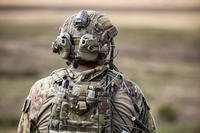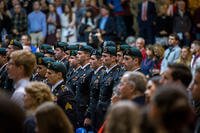"My wife says it's a pretty good likeness," Francis S. Currey told a reporter in 1998. Still, the former Army NCO never expected to see a 12-inch version of his younger self, complete with a tiny Medal of Honor; miniature Bazooka, Browning automatic rifle, and grenades; and doll-sized webbed helmet. Francis Currey, decorated World War II combat veteran, has been memorialized as the first Medal of Honor G.I. Joe Action Figure.
Since these popular Hasbro dolls were introduced in 1964, G.I. Joe has undergone several transformations and appeared in many different uniforms. From Canadian Mounties to pro wrestlers to "Eco-Warriors," G.I. Joe dolls have sparked many a child's imagination. However, some of the figures, like the one modeled after Currey, are "really involved," said Gary Parsons, curator of Florida's Camp Blanding Museum. "It's a collector's item, not a child's toy," Parsons told the Gainesville Sun. Almost all of the 100,000 Sgt. Currey dolls made have been purchased by eager collectors who understand how significant it is that Currey was chosen as the first representative in this series.
Currey, a sergeant with Company K, 120th Infantry, 30th Infantry Division, was 18 when he performed the heroic actions that forced his enemy to withdraw from the field of battle. Brought up in New York's Catskill Mountains, Currey was a crack marksman. On Dec. 21, 1944, he was with 3rd Platoon near Malmedy, Belgium, when the Germans went on the offensive. Currey and his men sought cover in an abandoned factory, where he found a bazooka.
The rockets Currey needed as ammunition were located across a heavily guarded street, but he charged through the artillery fire and reached them, using one of the rockets to destroy a tank. In the ensuing combat, Currey saved five American comrades by launching grenades at the enemy. He took command of a machine gun, and the Germans were finally forced to fall back under his relentless fire.
Currey's Medal of Honor was awarded not just for bravery, not just for personal sacrifice, not just for halting the advance of the enemy — although any of these might have been enough. This man's singular actions are credited with shortening the war by at least six weeks, for had the Germans broken through that day, they would have gained a huge advantage.















